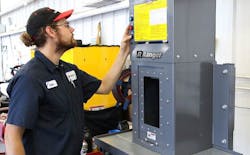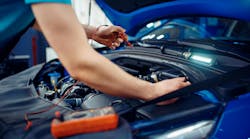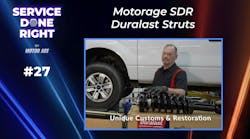The Ranger Oil Filter Crusher, No. RP-50FC, applies 25 tons of electric-hydraulic pressing power, flattening used oil filters to 20 percent of their original sizes while removing 95 percent of the residual oil. Filters up to 15-1/4" long and 6" in diameter are crushed in just 8 to 15 seconds, according to the company. The RP-50FC includes a remote electric foot switch and auto-locking safety door.
The Q&A
PTEN spoke with Bendpak/Ranger to learn more about the Ranger Oil Filter Crusher, No. RP-50C .
PTEN: What are some important features and characteristics of the product?
Bendpak/Ranger: The first feature we look at in an oil filter crusher is how easily it flattens metal filter casings. The RP-50FC applies 25 tons of force, so it even works on thick, stubborn truck filters that can cause trouble for lesser machines. The other important thing we need to look at is how much oil is actually drained out. This is where a lot of small businesses can get into trouble. Our crusher gets 95 percent of residual oil out of the filter, and it gravity drains the oil runoff into a collection bin beneath the crushing compartment. Because the RP-50FC is so powerful, it takes about 8 seconds to crush most cans down to 20 percent of their original size. We’re also proud of safety features like the automatic shutoff if the compartment door is opened during operation, as well as the convenient foot-pedal controls, which add versatility to how you control all major operations.
PTEN: Why was it developed?
Bendpak/Ranger: Oil filter casings are a common byproduct of every quick-lube station and repair shop, no matter what kind of work they do. Before the crushing process, these oil filters are filled with up to 10 oz. of waste oil, even if they’ve been gravity-drained. Therefore, these filters are considered hazardous waste and need to be properly handled and disposed of by licensed transporters, which is expensive and totally on the shop owner to pay for. The RP-50FC ensures your oil-heavy filters are flattened, emptied and totally reduced to scrap metal. In other words, using the RP-50FC means these casings will no longer be considered hazardous waste. If you’re not using a good filter, and there’s still waste oil in there after crushing, your whole businesses gets smacked with huge government fines, in addition to any standard disposal fees. Some especially strict laws have recently sprung up in California, but it’s everywhere, really. These fines are serious: up to $10,000 per violation per day. Our crusher gives you great peace of mind, so you don’t have to stress about it. The best part is that the RP-50FC pays for itself. All the used oil you’ve collected can also be repurposed or recycled, so now you have separate oil and metal casings that can actually earn you profit just for doing your job.
PTEN: How does it improve on previous iterations of the company’s products?
Bendpak/Ranger: We need to make sure that we’re offering bigger and better versions of our existing products whenever a need for them exists. Our previous model is still great for flattening common oil filter casings, but the RP-50FC is bigger, offers more than twice the crushing power and comes with a built-in stand. Some of those larger oil filters, like ones you see on commercial trucks and transport vehicles, are pretty robust, and we wanted to make sure we provide a machine that will handle those products flawlessly.
PTEN: How does it help automotive technicians save time and do their jobs easier?
Bendpak/Ranger: It’s a no-brainer, honestly. Under the definition of "solid waste," the Environmental Protection Agency (EPA) has determined that "recycled hazardous scrap metal is a solid waste when disposed of or recycled.” However, untrained or uncrushed filters contain too much oil to qualify for the scrap metal exemption. There are few options for disposing of non-terne plated filters (most commonly used).
- The generator could crush the oil filter using the most appropriate crushing method to force excess residual oil from the filter. As a best operating practice, the EPA recommends that used oil filters are crushed to ensure that all free-flowing oil is removed and to make certain the crushed filters qualify for the hazardous scrap metal recycling exemption. The used oil and metal casings can then be recycled and sold for profit.
- Alternately, puncture and hot-drain to remove the oil. This means puncturing the filter anti-drain back valve or the filter dome end and draining the filter above 60 degrees Fahrenheit (preferably near engine operating temperature) for a minimum of 12 hours to remove the oil. The used oil filters are then exempt from the hazardous waste regulations. The used oil and metal casings can then be recycled and sold for profit.
- Pay exorbitant fees to have the used oil filters collected as hazardous waste.
- Gravity drain the used filters by tipping them upside down and letting the oil slowly drain. In this method they are still considered hazardous waste. Costly collection fees will still apply.
With heightened awareness and scrutiny regarding the disposal of used oil filters, many processing facilities won’t even accept uncrushed filter casings anymore. Another plus is anyone can get trained on these machines in a matter of minutes. You put the filter in, close the door to the compartment and depress the green button. If you let go, the process stops. The oil that gets squeezed out is automatically collected through a flexible tube, so virtually every aspect of the oil removal and collection process is handled for you.
PTEN: Where can they find more information about the Oil Filter Crusher?
Bendpak/Ranger: You can read about the RP-50FC Oil Filter Crusher on our website. We’ve also got a great video: www.VehicleServicePros.com/20844373. Of course, there’s always our toll-free line at 1-800-253-2363 if you want to speak to a customer service or sales rep.
PTEN: What sets it apart from other, similar products available today?
Bendpak/Ranger: The crushing power, for one. 50,000 lbs is a lot! Also the speed at which it operates, as well as the sheer quality of the construction—it’s really incredibly well-built—stand apart from other crushers.


